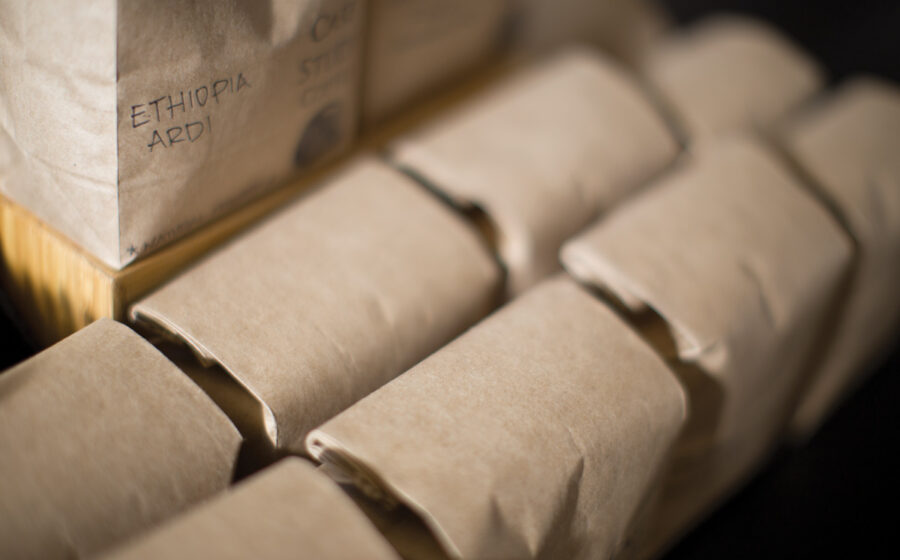[T]here’s not likely to be a partnership you strike that is more intimately wound into your potential success or failure than the one with your roaster. Often, the term partnership is used to describe a simple buyer-seller relationship. You don’t partner with your cleaning supplies seller; you buy their bleach. You can have that relationship with your roaster, but that setup indicates things aren’t right, either with the roaster’s commitment to you or your commitment to making great coffee. A roaster has a stake in how well you prepare its coffee, and you should want to prepare that roaster’s coffee the best you can. The partnership comes from that shared goal.
To begin, visit the roasters you’re interested in working with, or at the very least call them and chat with the owner or wholesale director, and request samples. Foremost, you should like their coffee, says Phil Lenaghan, director of wholesale at Stone Creek Coffee Roasters in Milwaukee. Naturally, you should like the people you will work with, too. And the services the roaster provides matter, greatly, especially training. “A roaster should provide you support in every area of need,” says Lenaghan. “A really great partner shouldn’t just be selling you beans.”

In addition to training, build-out, and technical support, Stone Creek, which runs a chain of cafés, can sell clients everything they need for their café, from syrup to espresso machines. This is not uncommon, and if a roaster doesn’t offer equipment, it should have good relationships with a range of dealers it can recommend to you.
Among new café owners, there’s a common impulse to want beans from a well-known national or regional roastery or to ship in beans from a super-cool roastery. Super-cool roasteries tend to be super-selective (that’s part of being cool, isn’t it?), and they often only work with cafés with sparkling credentials. And while popular roasteries have large wholesale businesses with good service, you might not be in easy reach of their education and tech staff. It’s worthwhile, whether to set your café apart, ensure access to your roaster’s resources, or support a fellow local business, to look for a roaster who’s closer to home.
There are more high-quality roasters to choose from than ever before. And not just in coffee’s great cities. Brown rattles off a huge list of roasters across the South, and similar lists could be compiled across the US and pretty much anywhere coffee has taken hold. Chances are, there’s a fantastic roastery close to you.

This partnership is, in the end, about buying great coffee. When you visit a prospective roaster, they will present you the range of their coffees, from their always-in-stock blends to limited-run single-origins. Even most small roasters offer more than ten coffees at a time, and it can be daunting to choose what you’ll use as your everyday espresso and filter coffee. Should you go with the bright, popping flavors of a Central American single-origin, or maybe the jam and tea tones of an Ethiopian? Or are those too adventurous for daily drinking, and should you go with something deeper in flavor, more traditional and perfect with a splash of cream?
Again, Lenaghan suggests choosing what you like, or at least making that your starting point. You also need to know what your customers want. If your customers will almost exclusively order milk-based espresso drinks, you will want a coffee that plays well with milk. If customers will order a decent number of straight shots, you’ll need your espresso to stand on its own. You may want to have two.
Lenaghan says that options expand with brewed coffee. More and more customers are learning about and open to interesting coffees. It’s common, still, for a café to offer the same brew every day, but many shops, following a model established by roaster-retailers, buy small amounts of many coffees and rotate what’s in the airpot, sometimes multiple times a day. “People are open to variety in coffee,” Lenaghan says. “At least the younger demographic seeks that out.”
If you’re not sure what your customers will want, your roaster should be able to dial in a profile. If you’re worried about over-ordering, at least as you establish your shop, Brown suggests choosing a coffee that doubles as an espresso and a filter coffee. A great single-origin, for example, could hold down both roles until your weekly needs are clear.
Drink lots of roasters’ coffee, drink it in as many preparations as you can. Your coffee is what your customers are coming for. Give them something great.
—Cory is Fresh Cup’s editor.







